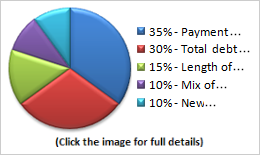Home > Passive Credit Repair > Where Does Credit Report Data Come From?
Where Does Credit Report Data Come From?
Posted on February 28, 2011
If you are just starting out on your credit repair journey, one of the key elements of rebuilding your credit will be your close association with your credit history report. Some consumers have never even seen their credit history report let alone have an understanding of what is contained in the report.
For all intents and purposes, getting to know your credit report is a requirement of fixing bad credit. It is this report that will dictate the steps you need to take for getting better credit scores and reestablishing a solid credit history. Because your credit report plays a large part in your credit repair adventure, it may be helpful for you to understand where the data comes from.
Forming a Credit Report
From the very first time you open an account with a creditor, a credit profile is established on your behalf. Moving forward, your credit profile will continue to gather information from creditors and companies where you have current open accounts in addition to the accounts you have since closed from the past. It is your creditors including banks, mortgage companies, retailers, credit card providers, and collection agencies that provide the data pertinent to your credit report.
As you use your credit accounts, your creditors will report back to the agencies, typically on a monthly basis, how you are handling the credit you were given based on the terms and conditions of your creditor contract or agreement. The information in the credit history report will be reflective of how you are paying your bills, whether they are on time, late, or missed entirely. Individual contracts/credit agreements will outline the terms of your obligation to the creditor and if you are failing to live up to those conditions, your credit report will show this fact to other creditors viewing your credit report.
Differing Histories
Not all creditors will report to all three credit agencies so your histories amongst the three agencies may be different. Credit scores may also be calculated in a different way so you should not be concerned about the data differences unless there is a large discrepancy between reports.
Regardless of which report you are looking at, the information contained on the report will be reflective of the current accounts you maintain for as long as they are active. All closed, charged off, or otherwise negative credit information will remain on a credit report for seven years, though there are some exceptions. For instance, bankruptcy situations will remain on a credit report for ten years.
Credit Repair Guidance
The first step toward better credit is to order your credit reports and check them for accurate reported information from your creditors. Any disputes you have about data that is not being reported correctly need to be filed with the individual credit reporting agency. You need to know where you stand credit-wise so you’ll know where to start on the road to better credit. A credit history report will have all the information you need to get started. The best news is that every consumer with an established credit history has the right to request a free copy of their credit report once a year. They can also access credit reports when denied credit approval for a period of 60 days.
Similar Posts:
- Wondering Why You Have Different Credit Scores?
- Consumers May Benefit from Consistent Credit Repair Services
- Credit Repair & Establishing a Credit History Under Age 21
- 5 Tips for Repairing Poor Credit
- Statute of Limitations May Be On Your Side in Credit Repair







Let's connect!